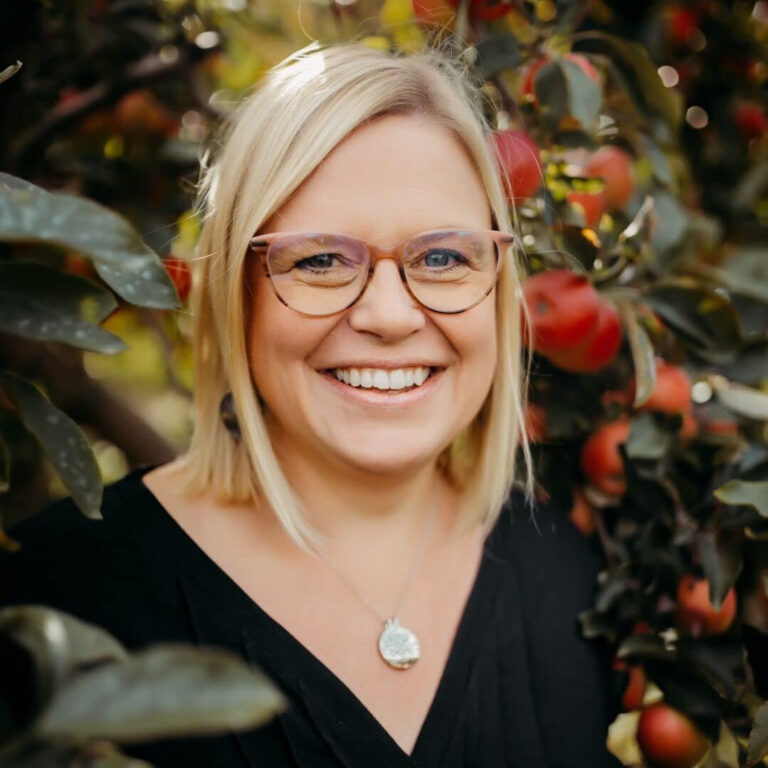In what has become a yearly Spring Break tradition, we recently drove home through the night. While my eyes struggle to stay open much past 11 pm, my husband has the ability (or capacity for caffeine consumption) to drive til early morning, passing the wheel over to me sometime in the 4 am hour.
Each year, I spend the earliest morning shift willing myself to stay alert, tracing the endless yellow lines that slice through the dark, and praying for the light.
And, each year, the light always takes longer to appear than I hope. Those final hours before day, waiting and pleading for some pink hue on the horizon, some lightening of the skies, are long ones. The sun is stubborn.

On this Easter Monday, I am reminded how long after the resurrection Jesus’ followers were waiting for the sun. The biblical stories after the resurrection portray some Easter jubilation, but just as much doubt, fear, and wrestling.
Several years ago, Pastor Mary Hulst, University Pastor at Calvin, visited my church and preached on Doubting Thomas, who she suggested might be better known as Logical Thomas. Doubting was not Thomas’s character flaw, but a legitimate reaction to a wild story about a friend who had been violently crucified now come back to life.
Though many re-tellings of this story place guilt and blame on Thomas, he does not deserve it. “Doubting is not sin,” Hulst assured us. “Jesus is not afraid of our questions.”
I feel similarly about the friends on the road to Emmaus, who are often cast as a bit dense, slow to realize. They are walking in the dark, and known for their despair, dejection, and disappointment.
Yet how many hours of our lives are spent on a similar Emmaus road—walking in the dark, in the not-knowing, in the groaning hours of the earth?
In the last snow, when you had hoped spring might finally have arrived.
In witnessing the bodies of those we love begin to break.
In the dark news headlines, the barrage of images and stories we wish we could mistake for pages from a dystopian novel—but must instead come to grips with as painfully real.
In the stumbling dark, the uncertain next step, we plead not just for faith in a risen savior, but actual and visual signs of that Kingdom, for mercy and justice in a world that seems completely off kilter and broken beyond repair.
The light takes longer to appear than we hope.
Maybe these stories in the Bible, some of the first we hear after the Resurrection, stories about waiting and making sense and doubting and wondering are not presented as cautionary tales of what not to do. Maybe they are not filled with guilt and shame and admonishment. Maybe they are God beside us in the dark, whispering, “You are not alone. I am beside you.”
I am beside you when the dark is disarming. I am beside you when, not if, you doubt. I am beside you when your heart is breaking. I am beside you when nothing makes sense.
During my most recent drive through the dark, I listened, on headphones as the rest of my family snored around me, to the final chapters of Leif Enger’s new book, I Cheerfully Refuse.

One of my favorite lines in this dark, dystopian—yet not entirely hopeless—story comes from the main character, Rainy, who says, “As enemies go, despair has every ounce of my respect.”
I first came across the book through a review by Mark Hiskes here in the Reformed Journal. Hiskes links Rainy’s stubborn grip on hope to something said by Australian musician Nick Cave, who lost two sons in separate tragedies: “Hopefulness is not a neutral position; it is adversarial; it is the warrior emotion that can lay waste to cynicism.”
On this Easter Monday, when we’re told God is making all things new, but may still be struggling to see it, blessed are you who wait in the dark. Blessed are you waiting for the sun.
Flower photo by Quentin Bounias on Unsplash


10 Responses
I love it, hope is adversarial.
Yes to ” hope is adversarial.” And kudos to Dana and Mary Hulst. Logical Thomas is a valuable counter-balance to emotionally impulsive Peter. If rigorous scrutiny (doubt) is a sin, certainty is also. We are not in a race to see who can first get to “right.”
Is faith based on a Confession of binding certainties, or is it an embrace of the mystery of the love of God and a commitment to give Him and neighbor our love?
Thank you, Henry Baron! I love this!
Oops – I meant for this comment to be in response to Brendon Haan’s blog.
Dana, your sleep is wide awake: love and faith are embodied in you all being on a highway during those hours.
“Hopefulness… is the warrior emotion than can lay waste to cynicism.” I take this to mean that what is laid waste is cynicism. Between 2013 and 2023, I lost a daughter, my first wife, my second wife, a brother, a sister, and a grandson. Since love is the greatest, hopefulness has to be a close second.
Dear classmate, I am so sorry to read of all your losses, but grateful that you still have confidence in hopefulness.
Al, I’m so sorry. That is an incredible amount of loss. I agree about hopefulness being a close second to love.
Thank you, Dana, for presenting your profound insights in such an engaging fashion.